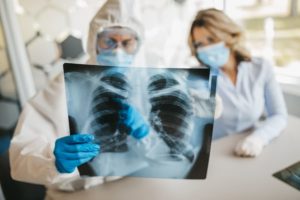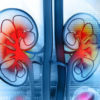What Is Pneumonia?
Pneumonia is the term for lung inflammation, which could be caused by a fungal, viral, or bacterial infection. It can affect one or both lungs or only certain lobes. Alveoli (air sacs) become inflamed and engorged with fluid or pus, which may solidify. Anyone can contract pneumonia, and it can become life-threatening if not accurately diagnosed and treated.
What Are the Different Types of Pneumonia?
There are various types of pneumonia depending on the illness’ location and how it was spread to the patient:
- Single pneumonia: Pneumonia is found in only one lung.
- Double pneumonia: Pneumonia is found in both lungs.
- Lobar pneumonia: Pneumonia is found only in some lobes.
- Walking pneumonia: Also called atypical pneumonia, this type may not cause any symptoms, and patients go about their routines without knowing they are sick.
- Hospital-acquired pneumonia: This type can be caught during a hospital stay or at a long-term care facility, and pneumonia-causing bacteria may be resistant to antibiotics.
- Community-acquired pneumonia: This type can be caught anywhere in public outside of medical settings.
- Aspiration pneumonia: This develops when someone inhales fluid, food, or vomit into their lungs, causing bacteria to multiply.
- Necrotizing pneumonia: This is a complication of an initial pneumonia infection, causing lung tissue to die. In turn, lung abscesses form and may require surgical intervention.
What Are Common Risk Factors for Pneumonia?
Specific risk factors depend on the type of pneumonia, but generally, they include:
- Being an infant, child, or over age 65
- Exposure to certain chemicals
- Having a weakened immune system
- Being unable to cough strongly enough to clear the lungs
- If in the hospital:
- Being on a breathing machine
- Having a tracheostomy tube inserted for breathing assistance
- Having other medical conditions such as asthma, heart disease, or emphysema
- Personal history of pneumonia, an organ transplant, HIV, or chemotherapy for cancer
- Taking medications to treat an autoimmune disease (i.e., rheumatoid arthritis)
- Occupations with high dust exposure, including farming, landscaping, gardening, military, and construction
Pneumonia also is more common in late summer and fall.
What Are Symptoms and Signs of Pneumonia?
There are three causes of pneumonia: bacterial, viral, and fungal infections. Ranging from mild to severe, signs and symptoms of the illness vary depending on the cause:
Bacterial Pneumonia Symptoms
- Breathing more rapidly than normal
- Chest pain
- Coughing up mucus
- Fatigue
- Fever above 100.4⁰ F
- Shortness of breath
Viral Pneumonia Symptoms
- Chills
- Dry cough with or without mucus
- Fever
- Fatigue
- Headache
- Muscle pain
- Stuffy nose
- Weakness
Fungal Pneumonia Symptoms
- Cough
- Difficulty breathing
- Fever
- Loss of appetite
- Sweating and shivering
How Is Pneumonia Diagnosed?
People with severe symptoms that warrant an emergency should report to the hospital for immediate evaluation. If symptoms are mild, patients should visit their primary care physician or an internist for diagnostic tests. Either way, physicians will form an accurate diagnosis after tests such as:
- Initial assessment and medical history
- Physical examination and lung auscultation (listening to the lungs with a stethoscope)
- Imaging tests such as a chest X-ray
- Sputum (thick lung mucus) culture and analysis
- Blood tests such as complete blood count, C-reactive protein, and more
- Pulse oximetry (measuring the saturation of oxygen in the blood)
- Bronchoscopy (a procedure to view the inside of the lungs with a camera)
What Are Treatment Options for Pneumonia?
There are many possible treatment avenues for pneumonia, all depending on the type and whether it was caused by a viral, bacterial, or fungal infection. General treatment approaches include:
- Antibiotics for bacterial pneumonia
- Antiviral medications for viral pneumonia
- Antifungal agents for fungal pneumonia
- Hospitalization and intensive care (if necessary)
- Supportive care measures, such as:
- Drinking plenty of fluids to loosen mucus in the chest
- Over-the-counter medications for pain management, such as non-steroidal anti-inflammatory drugs (NSAIDs)
What Are Common Pneumonia Complications?
Most pneumonia patients respond well to treatment. However, as with any illness, potential complications can arise during a pneumonia diagnosis. These can be serious or life-threatening, including:
- Difficulty breathing
- Lung abscess formation
- Pleural effusion (fluid/pus accumulating around the lungs)
- Bacteremia (bacteria entering the bloodstream from the lungs and spreading the infection to other organs)
- Acute respiratory distress (ARDS)
- Organ or respiratory failure
- Sepsis
Complications are more likely in older adults, young children, infants, and people with a weakened immune system, as well as patients with serious conditions such as cirrhosis or diabetes.
Can Pneumonia Be Prevented?
It might not be possible to completely prevent pneumonia, but some steps can help decrease the risk. These include:
- Getting vaccinated for protection from common pathogens
- Good hygiene practices to prevent respiratory infections, including:
- Washing hands frequently
- Regularly disinfecting high-touch surfaces
- Immediately discarding used tissues
- Covering the nose and mouth when sneezing or coughing
- Lifestyle modifications such as:
- Quitting smoking and avoiding second-hand smoke
- Drinking only in moderation
- Regular physical activity
- Eating a healthy, nutrient-rich diet
- Sleeping enough
- Sitting upright for less strain on the lungs when breathing
- Practicing deep breathing techniques to help support lung capacity
Frequently Asked Questions About Pneumonia
Here are some frequently asked questions about pneumonia:
How Long Does It Take To Recover From Pneumonia?
Pneumonia recovery usually takes seven days to one month for patients with more mild cases. However, because the illness can have serious complications, as well as severely impact the lungs, individual healing times may vary from one to six months.
Are There Any Long-Term Effects of Pneumonia?
The long-term effects of pneumonia can range from mental health conditions, such as depression and reduced cognitive function, to complications such as lung damage, worsening heart and blood vessel diseases, and organ failure. Individual risk for long-term pneumonia effects will vary depending on several factors, including age, health status, and the type of pneumonia.
Who Is at Higher Risk of Developing Pneumonia?
Seniors over age 65, infants, and young children are at the highest age-related risk, while those in certain occupations with high dust exposure also are more likely to become infected. Further, those with certain medical conditions, as well as patients in long-term care facilities or hospitals, are at elevated risk.
See Bergen Medical Associates If You Suspect You Have Pneumonia
Even mild cases of pneumonia can become life-threatening if the proper actions are not taken. If patients or their loved ones are experiencing symptoms of pneumonia, seek medical attention right away. Treating patients throughout northern New Jersey at multiple locations, Bergen Medical Associates is experienced in diagnosing and treating pneumonia, as well as a broad range of other illnesses. For more information about pneumonia care, contact Bergen Medical Associates today to schedule an appointment.
 Pneumonia is a respiratory illness caused by lung inflammation. People with pneumonia can easily spread the illness through coughing or sneezing, as they release infectious droplets into the air. Since pneumonia is so contagious, and it can quickly go from mild to severe, early diagnosis and treatment are imperative.
Pneumonia is a respiratory illness caused by lung inflammation. People with pneumonia can easily spread the illness through coughing or sneezing, as they release infectious droplets into the air. Since pneumonia is so contagious, and it can quickly go from mild to severe, early diagnosis and treatment are imperative.









